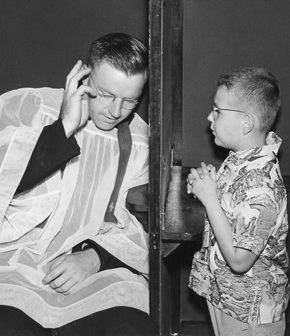 Harboring wounds and nursing resentments are like cancers that diminish all of us and eat up our energies. Harboring them is like closing a wound and leaving all of their consuming disease inside and untreated. The longer our resentments fester within us the more energy is sapped away from our living in happier relationships and better lives. All of us have had to deal with them; we know how they can eat away at our hearts.
Harboring wounds and nursing resentments are like cancers that diminish all of us and eat up our energies. Harboring them is like closing a wound and leaving all of their consuming disease inside and untreated. The longer our resentments fester within us the more energy is sapped away from our living in happier relationships and better lives. All of us have had to deal with them; we know how they can eat away at our hearts.
We can’t get along with everyone all of the time. Furthermore, if we hold to certain principles and stand up for certain things we’re going to offend some people. And they will make it their business not to get along with us.
Today’s Gospel reading from Matthew (18:15-20) reveals that in some of those early Christian communities, they had to deal with members who were tearing each other apart. We don’t know exactly what those hurtful actions were but we do know that hurtful things were being said and done.
Jesus was a realist. He had to deal with this part of life. He was opposed, even hated. Anyone who lives the values and principles of Jesus Christ will likely not get along with some people. There will be conflict. And perhaps there should be conflict in our lives. As a priest I get worried if I am found to be too acceptable. After all, God’s prophets were not liked all that much. In fact most of them were put to death because their message was so unpopular.
Now it is to be expected that we will not get along with our enemies. But the fact of the matter is that many times we find ourselves in conflict with those who are close to us and whom we want to love us. Husbands and wives can love each other dearly and still have to deal with conflicts. Families face it, and the best of friends can find themselves living in serious conflict and disagreement with each other. Jesus warned his disciples, and us with them, to expect that to be the case and so He gave them the power to free folks from being bound up by the wounds we cause each other That is what today’s Gospel account is all about, the most important part being the commission He gave to the leaders of His Church: Amen, I say to you, whatever you bind on earth shall be bound in heaven, and whatever you loose on earth shall be loosed in heaven.
Jesus is speaking as a realist in today’s gospel reading. He asked everyone to love as He has loved, knowing that disputes would arise, feelings would be hurt, and resentments would eat away in them like cancers. And He offered His disciples and us with them principles to deal with conflict and resentments.
The first principle is that the offended party should take the initiative. It’s the hardest one, too. We should note that even though we offended God by sinning against His love He took the initiative. He came to us sinners, the ones who had offended His love; He made the first move. The biblical history of our salvation is one wherein God is always taking the initiative to bring about reconciliation, forgiveness and healing. Jesus points us toward God’s ways: “If your brother should commit some wrong against you, go and point out his fault.”
But what do we do, and all too often? Well, we gossip behind backs of those who sinned against us or otherwise have offended us. We go to friends and whine and complain. We throw up walls of protection. We put the offending party into a deep and freezing silence – the so-called “cold shoulder.” We slink into the cave of our souls and there nurse and build up our resentments and hurt feelings. We claim victimhood and prepare our public announcements of our victimhood at the hands of this terrible perpetrators.
Supposing, however, that you attempt reconciliation but the two of you can’t work it out. When that happens it’s time, Jesus tells us, to take the matter to a trusted third party. Failure to do so only heaps new layers of resentment, hurt, and victimhood. When you talk the matter out with a trusted third party the very act of voicing your feelings can have a tremendously therapeutic effect in you. It can also begin the process of objectifying the matter, bringing it out of the swamp of emotional subjectivity. Hurt feelings and age-old resentments distort our vision and make it impossible to see things as they really were or are. And then pride does its evil work in our hearts and souls. Bringing in a third party, a reconciler, is all important.
It takes humility to heal relationships, the sort of humility God has in taking the initiative to come to us and invite us to work with Him in overcoming our estrangement from Him. Our pride often sabotages the healing process at this point. Countless numbers of spouses have come to me alone with the other spouse absent. Usually the absent party claims they can solve their own problem, if they indeed admit that there is a problem. Pride lurks there. “A priest,” they ask? What do we need a priest for? A priest can’t help us. What does a priest know about marriage? The truth, however, is that priests know a lot about marriage¼ about what it takes to have high quality relationships with others.
Finally there’s the matter of attitude. In the great majority of instances parties end up wanting to excommunicate each other, to throw them out of their inner circle. “It’s my way or the highway!” is their attitude. Many times good Christians will quote the Gospel passage we just read thinking that Jesus was advising excommunication in intractable cases. Such an interpretation points out instances in which people simply use Sacred Scripture without having first studied Sacred Scripture and taken it into their hearts. Yes, Jesus used the phrase “treat him has you would a Gentile or a tax collector.” The question we need to answer is: “How did Jesus treat Gentiles and tax collectors?” And how to we approach those with whom we live in conflict? The answer touches on the core of what it means to live as a Christian, what it means to live as Jesus lived.
The preeminent ministry of Jesus Christ, the mission given Him by God the Father, was the ministry of reconciliation. To be a Christian is to live in that ministry of reconciliation, forgiveness and healing. Forgiveness and healing doesn’t say that there was no sin. It doesn’t excuse hurt or sin. What it does do is heal us.
Certainly, given the times in which we live, that ways of healing and reconciliation are desperately needed, both in our personal lives, in our national life, and globally as well. If you want to know what God’s will is for you, it all begins with the power that Jesus is giving us. The ministry of reconciliation is clearly and centrally God’s will for you and for me. It’s Christ’s mission; it is yours in His. If we feel we don’t have what it takes to reconcile and that we can’t forgive, we must then remember that Jesus Christ gave us the power. Our power is found in His. [23rd Sunday in Ordinary Time- A]








